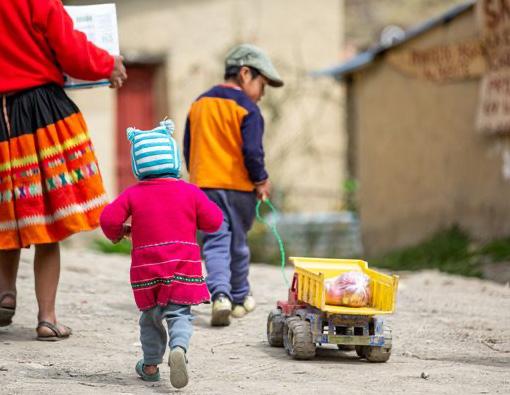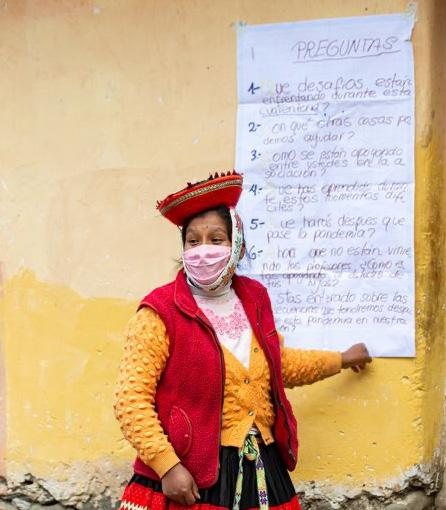
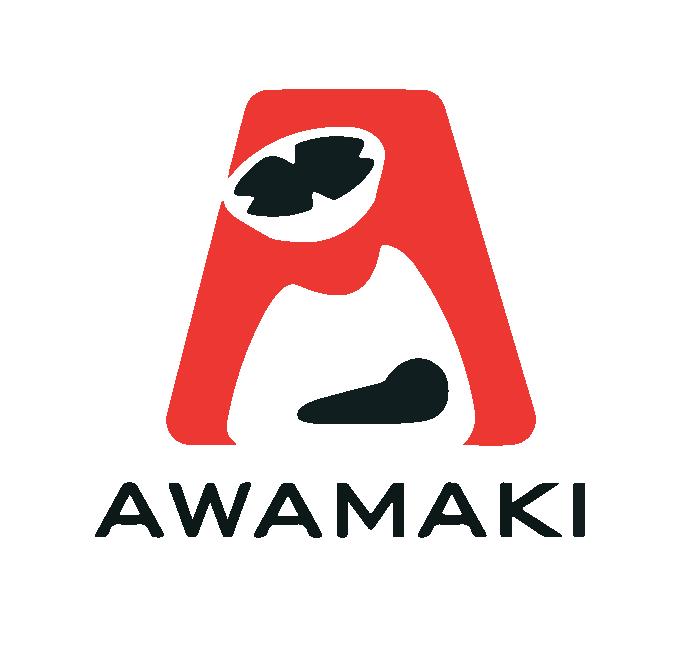
ANNUAL REPORT 2020
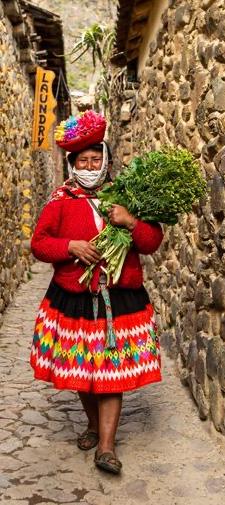




2 Who We Are 3 Message from Executive Director 4 Artisan Voices 5 Story of the Year 7 Dashboard 9 Financial Statements 10 Staff & Board of Directors 12 How to Get Involved 13 TABLE OF CONTENTS Awamaki @awamakiperu @awamaki Awamaki
WHO WE ARE
Awamaki is a community-driven social enterprise working in deep collaboration with Quechua artisans. Together we create grassroots programs to support and grow women-led cooperatives through heritage textiles, market access, and sustainable tourism.
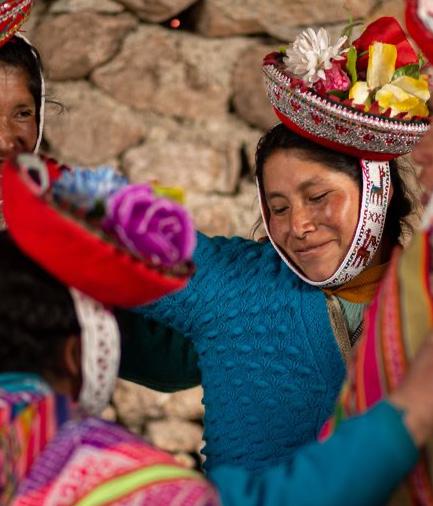
Building the financial independence of women is at the core of what we do. We recognize the importance of cultivating opportunities that honor artisans, their families, and their communities, which is why we co-create sustainable tourism opportunities built on respect and reciprocity.
From our training programs to the programs we create, our shared values guide us in every aspect of how we operate.
3
MESSAGE FROM OUR EXECUTIVE DIRECTOR
Dear Friends and Supporters,
This year has been defined by the COVID-19 pandemic and its grave impacts on our artisan partner communities in Peru.
There’s no way to sugar-coat it: It’s been a dark year. Peru has had one of the longest lockdowns in the world, and one of the most severe outbreaks of disease. In 2020, our artisan partners have gone from successful entrepreneurs excited about their businesses, filling textile orders, and connecting with customers, to having little to no financial resources or food security besides what they have grown on their small subsistence farms.
It has been heartwrenching for me and for the rest of our team in Peru to know they are in this position. In times like these, it’s extra important to lean into the quechua concept of ayni, or reciprocity. Up in their communities, our partners are embracing this old tradition; through the pandemic, they’ve formed many communal labor parties to help each other grow and harvest crops, share food, and care for their children.
We’ve embraced this concept of mutual support as well, and thanks to the tremendous support you all have provided throughout the year, we’ve been distributing monthly food donation baskets to each of our partner communities. Through your generous donations, our food baskets have supported 169 of our partner artisans and their 522 children throughout the year.
Though the situation is grim, we’ve continued innovating in hopes of bringing more sources of income to our artisan partners and staff. Our artisans and production team came up with a mask using handmade textile edging, and we cannot for the life of us keep it in stock online. We worked with Amazon to open a virtual store to keep selling our artisan products. And we focused on revitalizing our website to make it more accessible in this newly virtual economy.
This year has looked a little different than years past, and next year may also, but know that our commitment to our artisan partners, and to working with them to create a sustainable and prosperous future, is deeper than ever. Thank you for walking with us and with them on this long road. You are keeping us going, and we are so grateful.
Warmly,
Kennedy Leavens, Executive Director

4
ARTISAN VOICES
Ayni Through the Pandemic
Florentina wakes up to the sunrise to make breakfast for her family. She then goes to feed her animals, her children along to help and learn. Rainy days make Florentina happy because her potato fields are getting watered. Florentina grows many types of potatoes to feed her family. She also often eats her alpacas and sheep, and uses their fiber to weave her own clothes. Florentina`s family diet mostly consists of potatoes and some meat. No vegetables or fruits grow up in her village.
How has Florentina´s life has changed due to the pandemic?
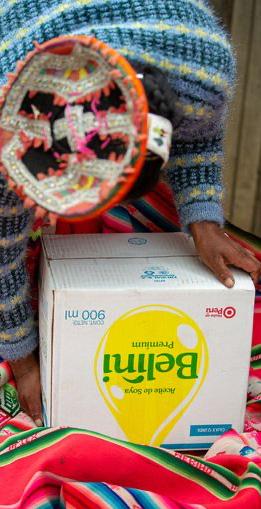
The answer is complex. Our artisan partners have sequestered in their villages. The health crisis is spreading rapidly in Peru, and the government has taken drastic action. Borders are completely closed, the tourism industry shuttered, foreigners stranded, public transport forbidden. Police and military patrol the streets to enforce the lockdown. A death from COVID-19 in one of our partner communities put everyone into a 19-day quarantine. Our artisan partners would need to walk many hours to reach the nearest market or store. But even if they did, without income from tourism, it is impossible for them to buy essentials like medicines, fruits, vegetables, oil and rice. Their families rely on tourism for all of their cash income, and the indefinite suspension of tourism will have severe effects.
And yet. We at Awamaki believe that we can draw strength from our artisan partners. We are deeply inspired by the resilience of our artisan partners, like Florentina. Their slow lifestyle, their strong community, and their work with craft and the land are a beautiful teaching for our current struggle.
When we can, we have been speaking to our artisans about what life is like in quarantine. Simeona, our artisan partner from Huilloc, told us “I’ve been healing with herbs, and I also have taught my children to listen to the news on the radio.” On a food drop to Huilloc Alto, Martha told us “I’ve tried to be more patient, to clean the house and to be more unified with family and
eat together.” Justina mentioned that she’s weaving her own clothes, and Fortunata highlighted the extra time they’ve all had to work in their fields. Josefina told us that her faith in God has helped her when she’s felt powerless this year. She is also grateful for her cooperative, Queuña Cocha Mayu, saying, “we have a savings fund from the cooperative, and we are thinking about redistributing that,” to help members get through this tough time.
Our artisan partners have also told us about returning to older ways, supporting each other with the custom of Ayni. "There are many people working in the Ayni," artisan Simeona from Huilloc told us. The principle of Andean reciprocity, Ayni means "today for you, tomorrow for me," and this idea has guided Andean life for centuries. Ayni governs how villages work together to farm each family's fields and share resources. In the pre-tourism economy, this shared community effort was necessary for small farming communities to survive in the harsh and remote Andes. "Our grandparents used to practice Ayni, then the farms were abandoned," said Agripina. Now, as the planting season begins, families are taking turns working in communal labor parties in each others' fields, trying to grow as much food as they can for the coming year.
They also explained how Ayni has guided other aspects of life. "There is no internet connection. We lend each other our cell phones so our children can take classes," Hilda from Huilloc explained. Artisan partner Gregoria from Kelkanca told us, "Ayni is done with food as well. We don't always have our pantries full."
These communities are strong and resilient, and there is much to learn from them, especially as relates to this powerful concept of reciprocity among community members. It is an honor to work with them and support them as they draw on their customs and the resources they have to build a better future, even facing the threat and uncertainty that the pandemic has brought.
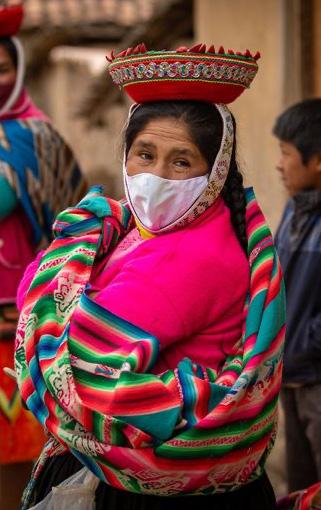
6
Food Support for Our Partners STORY OF THE YEAR
Early in the morning, before the rest of Ollanta was awoken from their rooster alarm clocks, our Peruvian employees, Yovana and Melissa, were starting their day. With the help of a local truck driver, they loaded sacks of rice and quinoa, bags stuffed with fresh fruit, and carefully stacked cartons of eggs into a truck bed. From there, they navigated the eerily empty dirt road up to our closest partner community, Huilloc. As they pulled up, they were warmly greeted (social-distance-masks-on-style) by our many artisan partners from Huilloc. The women all chatted for a bit, ranging from little pieces of gossip to serious acknowledgements about the state of the community, families, and education. Melissa recalls, “I am so grateful that we have been able to maintain our close relationships with these women that we’ve fostered over this past decade, even if it has to be through a mask.” Each woman then sat six feet apart, masks on, while Yovana and Melissa got to work distributing out the truckload of food. Once finished, Melissa and Yovana headed back to Ollanta to start their typical day working from home, while our artisan partners treated themselves to a fresh orange or two.

At Awamaki, we strive to give a hand up rather than a handout; opportunity rather than material support. But we recognize that sometimes, material support is what’s most needed. The horrible reality of this pandemic is that all tourism has shut down completely, and our artisan partners’ families have lost every source of income. Our artisans depended on tourism for their livelihood. Through our programs, they hosted visitors and sold their crafts to tourists who shop in our store in Peru. The artisans’ husbands also worked in tourism, mostly as porters on the Inca Trail. Without tourism, their families are suddenly facing food insecurity.
So this year, we are embracing the concept of ayni just as much as our artisan partners (see the previous article for more information on ayni). Following this idea of “today for you, tomorrow for me,” we are supporting our artisans with food drops this year because we know that tomorrow, or however long it takes, our artisan partners will once again be able to support us immeasurably by creating our products, leading our sustainable tours, and being the lifeblood of Awamaki.
We began distributing our monthly food baskets in April, one month after the pandemic uprooted all life here in Peru, after hearing from our artisan partners that the top expense for the income they earn from our program is purchasing food for their families. With all other operations ground to a halt, we decided to pour all of the donations we would receive this year into a fund for our new food basket program. We sent out
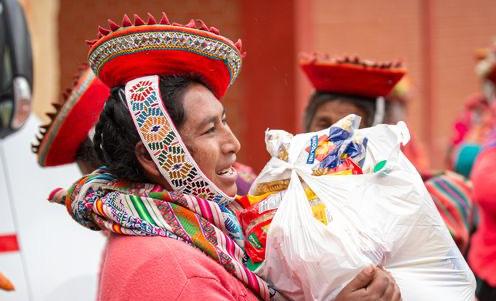
several calls for help to our donors and supporters, and we are incredibly grateful that you all showed up for us in a big way.
This year, your support enabled us to provide monthly food deliveries, April through December, to 163 artisan partners and their families. The food baskets we provided consisted of rice, oil, sugar, lentils, eggs, tuna, carrots, onions, fresh fruit, and other staples to supplement the potatoes that the artisans grow. Our current plan is to continue these food basket deliveries into 2021, and indefinitely, until tourism and the incomes of our artisan partners return to sustainable levels.
It’s not easy to put into words how incredibly thankful we are for every one of you for making these food drops possible. The support and food you have provided is a lifeline to the 522 children that our artisan partners support. It has also been hope and solidarity and a hand up at a time when quarantine measures left them without any resources from outside their small villages. We are so grateful for your belief in Awamaki and your willingness to support such a departure from our normal work as we figure out how to approach this crisis in the villages. We know how much compassion and heart you have for our work and our artisans, and that knowledge buoys us and our artisan partners.
8
DATA DASHBOARD: Food Baskets
163 Women
522 Children Supported
3 Indigenous Communities
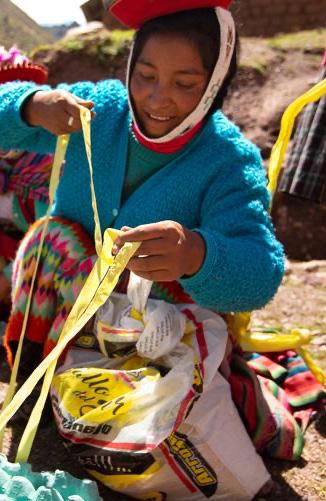
9 Months of Food Deliveries
1467
Total Baskets Delivered
9
FINANCIAL STATEMENTS
STATEMENT OF PROFIT AND LOSS
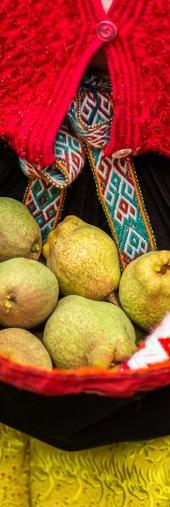
Revenues Fair Trade product sales Grants and Donations Tourism income Other Total COS Profit Expenditures Operations Facilities People Program Other Inventory reconciliation Total Net Income Asociación Civil Awamaki $ 71,900 $ 135,900 $ 16,400 $ 0 $ 224,200 $ 83,100 $ 141,000 $ 9,900 $ 14,600 $ 94,600 $ 52,300 $ 600 $ 0 $ 172,000 $ -30,900 2020 2019 $ 144,300 $ 90,800 $ 204,200 $ 200 $ 439,500 $ 129,800 $ 309,700 $ 12,300 $ 45,000 $ 145,800 $ 72,000 $ 400 $ 0 $ 275,500 $ 34,200
STATEMENT OF FINANCIAL POSITION
Note on financial statements: The Asociacion Civil Awamaki is a Peruvian non-profit civil association responsible for carrying out women’s empowerment programs in Peru.
These statements do not include the financial activity of Awamaki U.S., our partner organization that is a 501(c)(3) in the United States.

11
Assets Cash Accounts Receivable Inventory Total Assets Total Liability & Equity Asociación Civil Awamaki Liabilities and Equity Liability Accounts Payable Total Liability Equity Unrestricted Net Income Net Income Total Equity
$ 20,100 $ 0 $ 46,800 $ 66,900 $ 1000 $ 1000 $ 96,900 $ -30,900 2020 $ 35,500 $ -5,000 $ 61,400 $ 91,900 $ 0 $ 0 $ 57,700 2019 $ 60,000 $ 66,900 $ 91,900 $ 91,900 $ 34,200
STAFF & BOARD OF DIRECTORS
AWAMAKI STAFF
Kennedy Leavens, Executive Director
Yovana Candela, Director of Operations
Mercedes Durand, Head of Women's Artisan Cooperatives
Mollie Mae Henager, International Partnerships Manager
Mandish Kalsi, Sales Coordinator
Martha Zuniga, Production Coordinator
Melissa Tola, Sustainable Tourism Coordinator
Veronica Levy, Marketing and Communications Coordinator
Annemarie Toccket, Special Projects Consultant
Alejandra Carrillo-Muñoz, Head Designer
AWAMAKI BOARD OF DIRECTORS
Annemarie Toccket
Ladd Leavens
Kramer Gillin
Tom Weeks
Jessica Younker
Kennedy Leavens
Kristen Clark, CPA
Quincy Anderson
12
HOW TO GET INVOLVED SUPPORT OUR WORK
Awamaki is a 501(c)(3) nonprofit organization. Donations can be made online at www. awamaki.org/pages/donate.
SHOP OR VISIT SUSTAINABLY
Support our artisan partners by shopping for our ethically handcrafted accessories grounded in traditional Andean textile techniques at www.awamaki.org/collections/all.
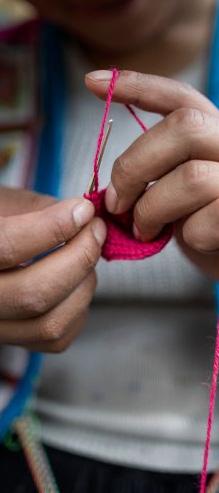
Carry our fair trade handcrafted products by becoming a retail partner. Learn more at www.awamaki.org/pages/wholesale.
Travel with us by booking a sustainable tour at www.awamaki.org/pages/sustainable-tourism.
VOLUNTEER WITH US
Learn more about our volunteer program at www.awamaki.org/pages/volunteer or contact us at info@awamaki.org to learn more about how you can be a part of Awamaki. FOLLOW US
On social media and sign up for our newsletter at www.awamaki.org




13
Awamaki
Awamaki @awamakiperu @awamaki Awamaki
